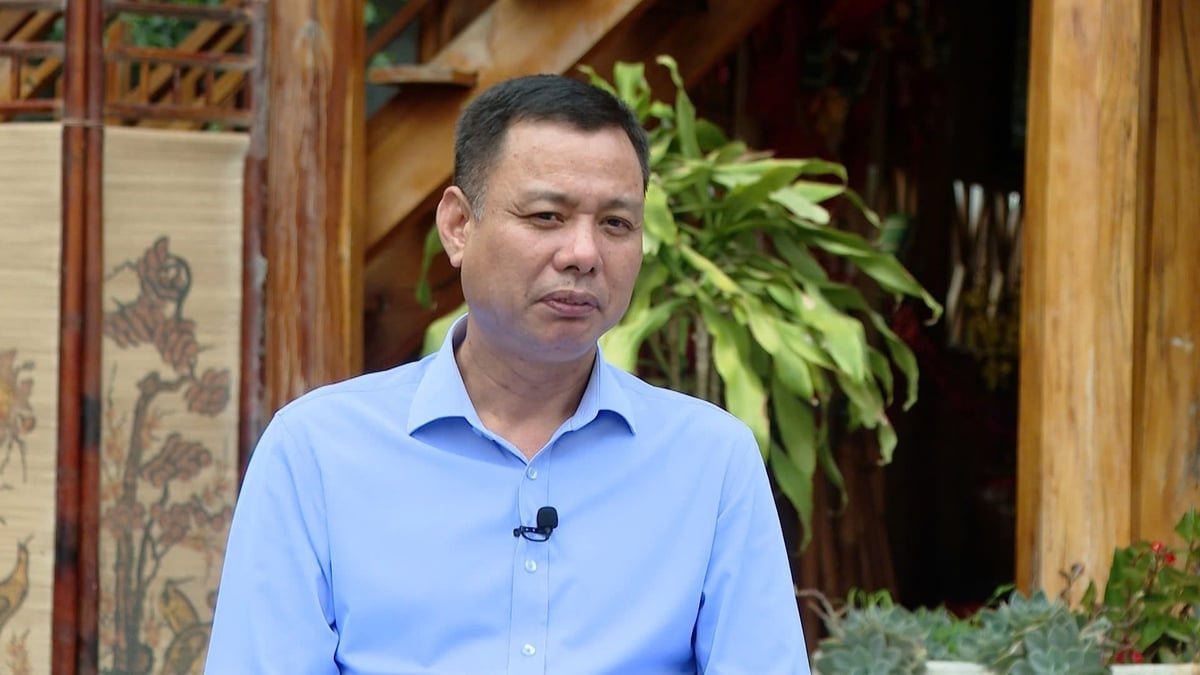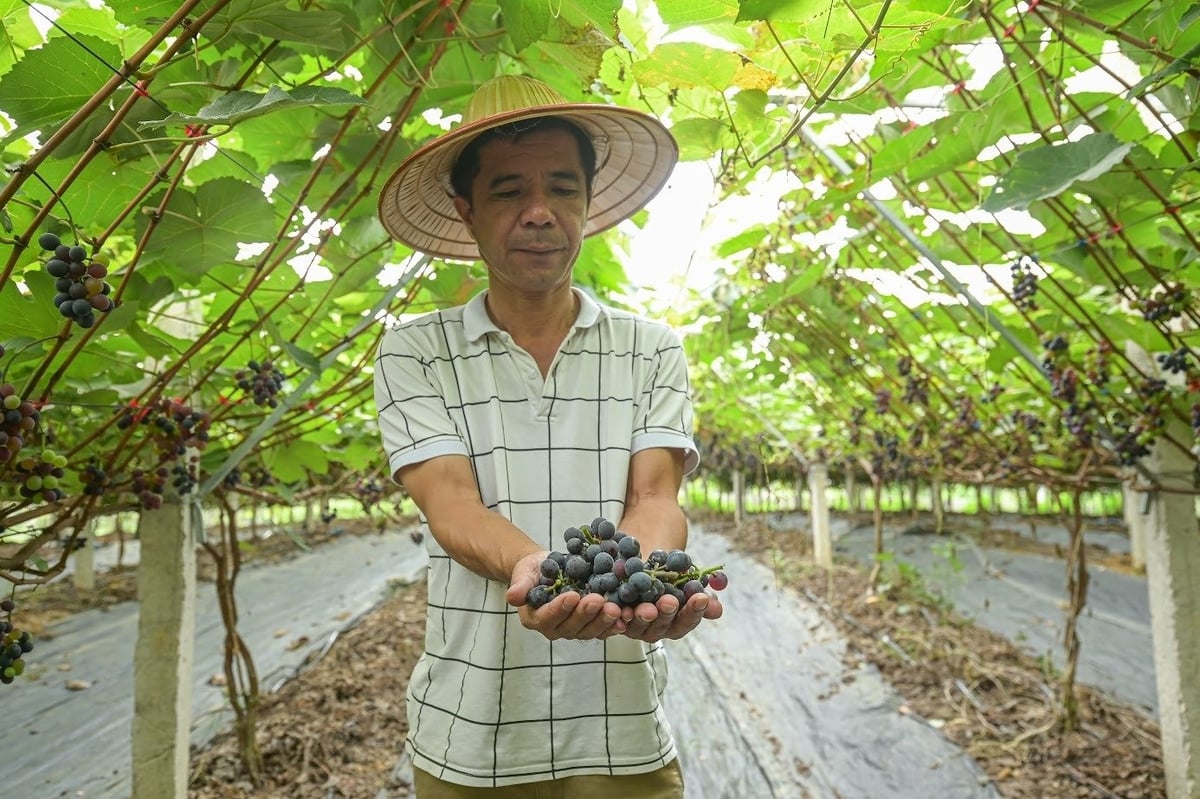November 20, 2025 | 18:49 GMT +7
November 20, 2025 | 18:49 GMT +7
Hotline: 0913.378.918
November 20, 2025 | 18:49 GMT +7
Hotline: 0913.378.918

Mr. Nguyen Thanh Cong has been involved with the fruit cultivation initiative since its early days. Photo: Duc Binh.
In 2015, the Standing Committee of Son La province adopted Resolution 121, outlining a policy to restructure crop production on sloping lands. The key direction was to replace short-term, low-efficiency food crops with fruit trees.
Mr. Nguyen Thanh Cong recalled: "Before Resolution 121 was issued, Son La had already undergone a preparatory phase with support from units under the Ministry of Agriculture and Rural Development (now the Ministry of Agriculture and Environment), along with various central ministries, agencies, and research institutes. During that time, we began trialing several crop varieties, including fruit trees."
Thanks to the determined implementation by local party committees and authorities, under the direct leadership of the Provincial Party Secretary and the Standing Committee, the policy was effectively brought into practice. It became embedded in daily life. Over the course of more than a decade, the people of Son La embarked on a challenging and strenuous journey, yet one that offered numerous opportunities and ultimately led to remarkable achievements. The policy was embraced and implemented consistently from the provincial level down to districts, communes, and the entire population.
Mr. Cong added: "Son La has now become a region known for sustainable and effective agricultural economic development. It is also emerging as a key agricultural processing center in the Northern midlands and mountainous region. Looking back, we must objectively assess the tasks accomplished, acknowledge the limitations that remain, and set clear directions for the future."

Son La is emerging as a major fruit-growing hub. Photo: Duc Binh.
After 10 years, the policy has proven highly effective, truly taking root in local life and opening up vast areas for agricultural production. The province now has over 85,000 hectares of fruit trees, with this year’s crop yield expected to exceed 510,000 tons. More importantly, Son La has established specialized cultivation zones for various fruits, including approximately 19,800 hectares of mangoes, as well as longan, plums, avocados, dragon fruit, strawberries, and custard apples.
Each growing area adheres to production standards, including VietGAP, GlobalGAP, and other protocols, to meet the requirements of importers and processing companies. Another key achievement is the issuance of planting area codes, traceability systems, and packing facility codes - ensuring high standards in production, processing, and distribution of agricultural products.
To become a regional hub for agricultural processing, Son La has actively attracted major investors. The Provincial Party Standing Committee has been especially proactive in investment promotion. As a result, there are now more than 580 processing facilities, including 18 major processing plants such as Doveco, AC Food, TH, and factories dedicated to industrial crops like Phuc Sinh Coffee, Minh Tien Coffee, and BHL cassava.
Vice Chairman Cong also shared that the province has over 2,900 longan processing facilities, as well as many cooperatives that process fruits and vegetables into value-added and OCOP-certified products, such as Quyet Thanh Cooperative in Moc Chau. Notably, several cooperatives have successfully brought their agricultural products to international markets. For example, Nong Pieu Cooperative has exported plums to four European countries and strawberries to Singapore.
This production chain has helped increase the added value of agricultural products and improve incomes for farmers, cooperatives, and businesses, especially those directly involved in the value chain and in major cultivation areas. As a result, the livelihoods of local people have significantly improved.
Alongside this development, the province's economy has seen substantial growth. Son La is currently striving to meet the targets set by Government Resolution 25, aiming for an 8% growth rate this year and over 10% in the next term.
However, fragmentation still exists in some growing areas. Prior to 2015, most people only grew fruit trees for subsistence or small-scale market sales. Today, agricultural production must aim to serve not only domestic demand but also meet export market needs.
Cooperatives have been working to increase the added value per hectare of cultivation. Many areas now generate an income of 300 - 400 million VND per hectare, with some exceeding 1 billion VND per hectare. These results come from effective production organization, the application of science and technology, digital transformation, and improved production management.
"Looking back on the 10-year journey of fruit cultivation development, Son La has every reason to be proud of becoming the leading fruit-growing center in the Northern midlands and mountainous region," Mr. Cong concluded. "We are determined to preserve our key products, maintain existing production zones, and continue developing organic agriculture and a circular economy."
$ 1 = VND 25.810 - Source: Vietcombank.
Translated by Phuong Linh

(VAN) The information was shared at the seminar 'Urban Agriculture - Solutions for Developing Green Spaces,' organized by the Kinh te & Do thi Newspaper and the Biotechnology Center of Ho Chi Minh City.
/2025/11/19/4141-2-132831_216.jpg)
(VAN) One of Japfa's outstanding solutions is implementing digital transformation and artificial intelligence (AI) to optimize operations, enhance productivity, and advance sustainable development.
/2025/11/19/4847-1-093540_448.jpg)
(VAN) The Gia Lai Provincial People’s Committee had a working session with the delegation of the U.S. Department of Agriculture, the State of Idaho, and representatives of the State's leading enterprises.

(VAN) Ca Mau has a sufficient foundation to become a strong regional aquaculture center, where production integrates the economy, the environment, and the lives of the people.

(VAN) SEIKI Group envisions itself as a pioneer in the ‘dual transformation’ of digital technology and green industry, standing alongside the Government and Vietnamese businesses in their pursuit of sustainable development.

(VAN) The VNGEONET network affirms Viet Nam's progress in mastering digital space, providing a precise positioning data platform to serve socioeconomic development.
/2025/11/14/3247-1-184556_35.jpg)
(VAN) Thai Nguyen is methodically implementing digital transformation in the livestock sector, laying the foundation for a modern, transparent, and sustainable agriculture.